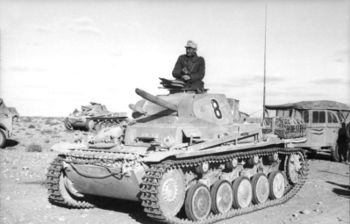الفيلق الأفريقي
| الفيلق الأفريقي | |
|---|---|
| نشطة | 12 February 1941 – 13 May 1943 |
| البلد | |
| الفرع | Wehrmacht Heer |
| النوع | Expeditionary Force |
| الحجم | فيلق |
| مقر الحامية | طرابلس, ليبيا الايطالية |
| الكنية | Hitlers sideshow |
| الشعار اللفظي | Ritterlich im Kriege, wachsam für den Frieden ("Chivalrous in War, Vigilant for Peace") |
| الألوان | Yellow, Brown,tan |
| الاشتباكات | الحرب العالمية الثانية |
| التكريمات | iron cross |
| القادة | |
| أبرز القادة | Erwin Rommel Ludwig Crüwell Walther Nehring |
| الشارات | |
| رمز التمييز |  |
| رمز التمييز | Seal of the Deutsches Afrikakorps |
الفيلق الأفريقي German Africa Corps (ألمانية: Deutsches Afrikakorps,(بالألمانية: Afrika korps) هو فيلق ألماني أوجد بصورة خاصة لدعم القوات الإيطالية في شمال أفريقيا، بدات مشاركته في العمليات العسكرية في شمال أفريقيا في 12 فبراير 1941 لعب دورا كبيرا في معارك شمال أفريقيا وانتهى كقوة مقاتلة في 13 مايو 1943 بعد استسلام قوات المحور للجيوش البريطانية والامريكية في تونس.
التنظيم
كان اسم السري (الشفرة أو الكود) لعملية تأسيس فيلق أفريقيا هو زهرة نبات الشمس (بالألمانية: Unternehmen Sonnenblume) وإنگليزية: Operation Sunflower. تكون الفيلق في بدايته من قوات ألمانية وإيطالية، القوات الألمانية التي انتسبت إلى هذا الفيلق خلال مدة الحملة في شمال أفريقيا والبالغة 27 شهر هي الفرق المدرعة 21 و 15، الفرقة 90 الخفيفة، الفرقة 164 الخفيفة وفرقة المشاة 334، ولواء المظليين الأول التابع للجيش الألماني -الفيرماخت- الذي غير اسمه فيما بعد إلى لواء رامكة نسبةً إلى قائده هيرمان بيرنهارد رامكة ولواء المظليين الأول التابع لسلاح الطيران الألماني وكانت قيادته مرتبطة بهيرمان غورينغ، وهناك مقبرة تظم رفات 5000 من المظليين التابعين لهذا اللواء في شبه جزيرة بون في تونس.
اما القوات الإيطالية فهي تسع فرق منها فرقتين مدرعة وفرقتين ميكانيكية وثلاث فرق مشاة ولواء المظليين الأول المسمى لواء فولغور، وكان تدريب هذا الفيلق بصورة أساسية على كيفية القتال في الصحراء وتحمل درجات الحرارة العالية حتى ان درجات حرارة ثكنات هذا الفيلق في أوروبا كانت عالية جدا، منحت هذه القوة اسم الفيلق الأفريقي في اب 1941 بعد ستة أشهر غير هذا الاسم إلى الجيش المدرع الأفريقي ثم غير إلى الجيش المدرع الألماني الإيطالي ثم إلى مجموعة الجيوش الأفريقية
بعد الانزال الأمريكي في الدار البيضاء وصلت وحدات جديدة إلى شمال أفريقيا لتكون الجيش المدرع الخامس وغير اسم الفيلق الأفريقي إلى الفيلق الإيطالي الأول وعين الجنرال الإيطالي جيوفاني ميسي لقيادته في الميدان واعطيت تسمية الفيلق الأفريقي لقوات جديدة فيما أصبح الجنرال رومل القائد العام للجيش المدرع الخامس والفيلق الإيطالي الأول والفيلق الأفريقي الجديد.
القادة
من ابرز قادة الفيلق الأفريقي:
- الجنرال إرفين رومل
- الجنرال لودويغ كروويل
- الجنرال والتر نهرنغ
التركيب والمصطلحات
Ramcke Brigade
الاعتقال في ولاية ميسيسيبي
Resurrection of units
Afrika Korps marching songs

1st song: Panzer rollen in Afrika vor / Heiß über Afrikas Boden
Heiß über Afrikas Boden die Sonne glüht.
Unsere Panzermotoren singen ihr Lied!
Deutsche Panzer im Sonnenbrand,
Stehen zum Kampf gegen England
Es rasseln die Ketten, es dröhnt der Motor,
Panzer rollen in Afrika vor!
Translation
The sun shines hot over African ground.
Our panzer engines are singing their song!
German panzers in the blazing sun,
As they stand ready for battle against England.
The tracks rattle, the engine roars,
Panzers rolling forwards in Africa.
2nd Song: "Unser Rommel" ("Our Rommel")[1]
1.
Wir sind das deutsche Afrikakorps
Des Führers verwegene Truppe
Wir stürmen wie die Teufel hervor
Versalzen dem Tommy die Suppe
Wir fürchten nicht Hitze und Wüstensand
Wir trotzen dem Durst und dem Sonnenbrand
Marschieren beim Takt unserer Trommel
Vorwärts, vorwärts
|:Vorwärts mit unserem Rommel!:|
Translation of verse 1
We are the German Africa Korps
The Führer's daring troops
We attack like the Devil
Make things hot for the Tommys
We fear neither heat nor desert sand
We brave the thirst and the blazing sun
Marching to the beat of our drum
Forwards, forwards
|:Forwards with our Rommel!:|
2.
Die Briten fürchten uns wie die Pest
Sie sitzen auf glühenden Kohlen
Wir rächen Deutsch-Ost und rächen Südwest
Das einst sie uns feige gestohlen
Sind Churchill und Roosevelt auch Wut entbrannt
Wir werfen die Feinde in jedem Land
Es schlägt Generalmarsch die Trommel
Vorwärts, vorwärts
|:Vorwärts mit unserem Rommel!:|
Translation of verse 2
The British fear us like the plague
They're like cats on a hot tin roof
We're taking revenge for German East (Africa) and for South-West (Africa)
Which were cowardly stolen from us
Churchill and Roosevelt are getting mad
We beat the enemy in every country
The drum beats 'get ready'[Note 1]
Forwards, forwards
|:Forwards with our Rommel!:|
3.
Mit uns im Kampf und im Siege vereint
Marschieren Italiens Scharen
Bis einst die Sonne des Friedens uns scheint
Und wieder gen Deutschland wir fahren.
Doch wenn mich die feindliche Kugel fand
So lasset mich ruhen im Wüstensand
Und rühret noch einmal die Trommel
Vorwärts, vorwärts
|:Vorwärts mit unserem Rommel!:|
Translation of verse 3
With us united in battle and in victory
Italy's cohorts are marching
Until one day the sun of peace will shine on us
And we will return to Germany.
But if the enemy's bullet gets me
Then let me rest in the desert sand
Let the drum beat once more.
Forwards, forwards
|:Forwards with our Rommel!:|
انظر أيضاً
- Army Group Africa
- Erwin Rommel
- Panzer Army Africa
- Fliegerführer Afrika
- Western Desert Campaign
- North African Campaign
- First Battle of El Alamein (1–27 July 1942)
- Second Battle of El Alamein (23 October – 4 November 1942)
- László Almásy
- Operation Salaam
- Hans von Luck
- Hans-Jürgen von Arnim
- Panzer Division
- Afrika Korps (game)
- Heer
- Eastbourne Redoubt, home of General Hans-Jürgen von Arnim's Steyr 1500A Africa Korps Staff Car
الهوامش
- ^ A German military signal meaning: "Attention! Assemble at your positions!"
المصادر
- ^ Song text and MP3(not identical at the ending of the third verse) of Unser Rommel Retrieved 2007-02-12
- Cooper, Matthew (1990). The German Army 1933–1945. Scarborough House. Chelsea, MI, USA. ISBN 0-8128-8519-8.
- von Mellenthin, Major General F. W. (1971) [1956]. Panzer Battles: A Study of the Employment of Armor in the Second World War (First ed.). New York: Ballantine Books. ISBN 0-345-24440-0.
- AFRIKAKORPS.org/AANA Research Group
- Rommel's Kampfstaffel
قراءات أخرى
- Editor Major-General Alfred Toppe Desert warfare:German experiences in World War II, written with the assistance of nine German commanders who served in North Africa, the manuscript (translated by Mr. H. Heitman) represents a collaborative attempt to determine "as many factors as possible which exerted a determining influence on desert warfare."
- Hans von Luck's memoirs Panzer Commander: The Memoirs of Colonel Hans von Luck include chapters from his time in North Africa under Rommel.
وصلات خارجية
- Afrika Korps History[dead link]
- Panzer-Armee "AFRIKA" Kommandeurs[dead link]
- Knight's Cross of the Iron Cross Holders: North Africa[dead link]
- Rommel's Kampfstaffel[dead link]
- Afrika Korps Uniforms[dead link]
- Unser Rommel - Wir sind das deutsche Afrikakorps - in MP3 format
- Deutsches Historisches Tonarchiv - see "Lieder und Märsche des Afrika Korps" (Commercial site with songs available on CD)
